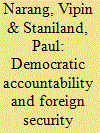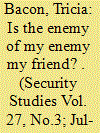|
|
|
Sort Order |
|
|
|
Items / Page
|
|
|
|
|
|
|
| Srl | Item |
| 1 |
ID:
160741


|
|
|
|
|
| Summary/Abstract |
Identifying the links between democracy and foreign security policy has proven elusive. This paper engages this research agenda by developing a novel theory of “accountability environments” and exploring it in the case of India. We hypothesize that the varying electoral salience of foreign security policy and the clarity of responsibility for policy outcomes combine to create different accountability environments in which politicians operate. Accountability environments determine the incentives that politicians face for devoting effort to external security issues. We illustrate the argument with evidence from India over time and across issue areas (India, Pakistan, and defense procurement/development). Scholars need to incorporate the complexities and diversity of representation and rule into the study of democratic politics and international relations.
|
|
|
|
|
|
|
|
|
|
|
|
|
|
|
|
| 2 |
ID:
160742


|
|
|
|
|
| Summary/Abstract |
Using data from the Teaching, Research, and International Policy (TRIP) project, we address several questions posed by students of the international relations (IR) discipline, specifically, whether and to what extent: US scholars, institutions, and journals dominate the field; national communities of IR scholars are insular or inward-looking; and/or the discipline is theoretically, methodologically, and epistemologically diverse. We draw from two major data sources: a series of cross-national surveys of IR faculty in thirty-two countries and a database of journal articles published in the twelve leading IR journals from 1980 to 2014. We find obvious signs of US hegemony and insularity. Other national IR communities are relatively open to foreign ideas, if not to hiring scholars trained in other countries. Finally, despite US hegemony in the discipline and pockets of geographic insularity, we see a diverse field characterized by a wide range of theoretical, methodological, and epistemological commitments. We conclude with a discussion on the sources and consequences of diversity in the international relations discipline.
|
|
|
|
|
|
|
|
|
|
|
|
|
|
|
|
| 3 |
ID:
160739


|
|
|
|
|
| Summary/Abstract |
The terrorist organizations that have posed the greatest threat to international security are those with allies. Terrorist groups at the core of alliance networks, particularly the Islamic State and al Qaeda, define the threat today, as they are able to accrue and disperse the benefits of their alliances—including greater lethality, longevity, and resilience—to their partners. While the consequences of these alliances are clear, their causes remain poorly understood, especially with respect to why terrorist alliances cluster around a small number of organizations. I propose that groups ally with the organization at the core of a network to address organizational deficits. In addition, the prospective partners must have both complementary needs and the ability to link their ideologies and frames to build a shared identity. Finally, groups must overcome their inherent suspicions and build trust to ally. These three mechanisms lead to alliance formation, but they also offer numerous avenues for disruption.
|
|
|
|
|
|
|
|
|
|
|
|
|
|
|
|
| 4 |
ID:
160740


|
|
|
|
|
| Summary/Abstract |
This article provides a new theory of hot pursuit—the use of military force by a state against a nonstate actor across borders—in international relations. Drawing from the literature on civil-military relations, I argue that attitudes on limited use of force in peripheral areas will vary between civilian and military, with the latter preferring to treat hot pursuit as a policing operation, whereas the former will treat it as a military one. The logic of my argument is that militaries are oriented structurally and culturally to fight conventionally and against state near-peer adversaries. Threats emanating from nonstate actors, while at times perceived to be existential, require “pin-prick”-style targeted airstrikes, raids by commando forces, or policing operations along a state's periphery. I draw on an original dataset of “hot pursuit” (1975–2009) I collected and examine two recent case studies: India's hot pursuit of ethnic militants into Myanmar and Turkey's pursuit of Kurdish militants into Iraq and Syria.
|
|
|
|
|
|
|
|
|
|
|
|
|
|
|
|
| 5 |
ID:
160744


|
|
|
|
|
| Summary/Abstract |
While previous studies focus most of their attention on the impact of civil-war violence on postwar norms of interpersonal trustworthiness, they overlook the importance of political actors' nonviolent interference in civic life during such conflicts. This paper investigates the relationship between wartime provision of public services and postwar trustworthiness norms among civilians. Using original survey data collected from Sri Lanka, empirical analysis suggests that postwar norms of interpersonal trustworthiness tend to weaken if individuals experienced higher amounts of service provision by the Liberation Tigers of Tamil Eelam. To build their own apparatus to provide efficient services, the rebels deeply intervened in and altered local institutions. Such transformation of local institutions dissolves existing social groups and associations that previously tied residents together. Efforts of post-civil-war community development would be ill equipped if these institutions were treated as nonexistent. Postwar development programs need to provide new, effective local institutions to replace those established in wartime.
|
|
|
|
|
|
|
|
|
|
|
|
|
|
|
|
| 6 |
ID:
160743


|
|
|
|
|
| Summary/Abstract |
When are domestic publics most sympathetic to nationalist territorial ambitions? Conflict scholars commonly assume support should be greatest when territory is framed as being of intangible value to national identity over tangible importance to national security and economic prosperity. This should be especially true regarding lost homelands, territories wherein a state has previously exercised sovereignty and to which it has enduring ethnic ties. This article presents experimental evidence that directly challenges these assumptions, demonstrating the variability of Serbian popular attachments to three lost territories: Kosovo, Bosnia, and Montenegro. It finds that intangible framings do not necessarily engender stronger assertions that such territories belong to the homeland than tangible framings do. Nor do they necessarily motivate greater support for nationalist territorial agendas. These findings cast doubt on conventional wisdom regarding domestic publics' contributions to territorial conflict and offer refined insights regarding in which instances intangible claims are most conflict-prone.
|
|
|
|
|
|
|
|
|
|
|
|
|
|
|
|
|
|
|
|
|